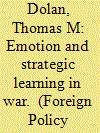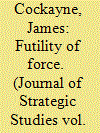| Srl | Item |
| 1 |
ID:
148154


|
|
|
|
|
| Summary/Abstract |
This paper applies the framework of affective intelligence theory—a theory of how emotions affect attitudes, beliefs, and decision making—to elite learning during war time. Doing so provides novel hypotheses about when and how war leaders respond to new events. These hypotheses are tested using a set of cases drawn from the Winter War. Findings suggest that these emotion-derived hypotheses may be more effective in predicting learning and its absence than purely Bayesian or extant cognitive models of learning.
|
|
|
|
|
|
|
|
|
|
|
|
|
|
|
|
| 2 |
ID:
134390


|
|
|
|
|
| Summary/Abstract |
Confronted by non-conventional non-state military forces enjoying high – but very localized – social legitimacy, the United Nations Mission in Haiti (MINUSTAH) struggled between 2004 and 2007 to embed the use of force in a larger strategy of state consolidation. The article explores the confrontations between MINUSTAH and unconventional armed groups in Haiti during this period. It traces MINUSTAH’s operations against criminal gangs, and the resulting process of strategic learning. It explores how tactical innovations allowed MINUSTAH to defeat the gangs, but also highlights that the larger political objective – breaking the connection between the gangs and Haiti’s political-business elite – remained unarticulated and elusive – and perhaps ultimately unfeasible, given the necessity of Haitian state consent for continued UN operations in the country. In a final post-script the article reflects on the return of the gangs after the earthquake of 12 January 2010, and what it signals about the limited impact of tactical force on the presence and power of political-criminal networks.
|
|
|
|
|
|
|
|
|
|
|
|
|
|
|
|
| 3 |
ID:
151018


|
|
|
|
|
| Summary/Abstract |
Jihadist terror is a multidimensional challenge that compels unique difficulties on compatibility between the military campaign and the political goal. Compatibility between military campaigns and political goal requires a deeper understanding about the Jihadi terrorism phenomenon that could be achieved by a strategic and diagnostic learning process. Such learning requires certain characteristics, which enable the creation of open discourse. This article introduced definitions of closed and open discourse, characterized the required conditions for creating open discourse, and explained the linkage between strategic learning and open discourse. This article aims to add another theoretical layer to Rebecca Schiff’s “targeted partnership” concept by elaborating on the essence of the encounter and discourse between the political and the military echelons in the context of terrorism in the Middle East, using examples from the American and Israeli experience. The concepts of “Discourse Space” and “Diagnostic Learning” are corresponding with Schiff’s concept and accomplish it.
|
|
|
|
|
|
|
|
|
|
|
|
|
|
|
|